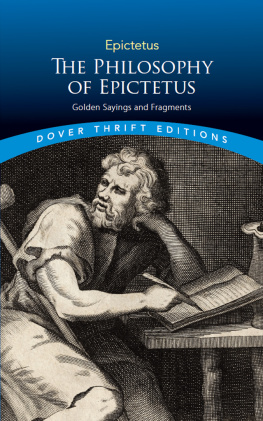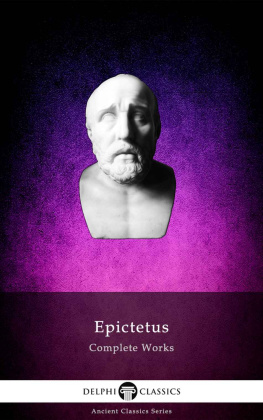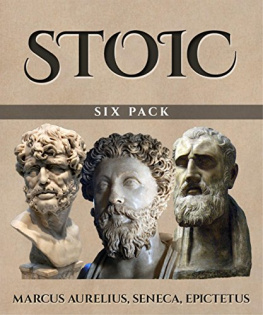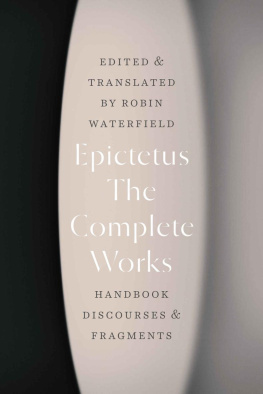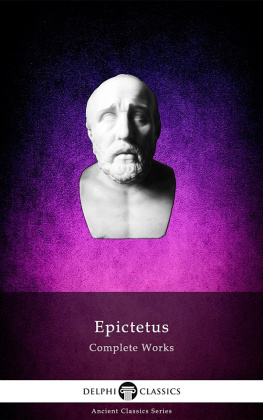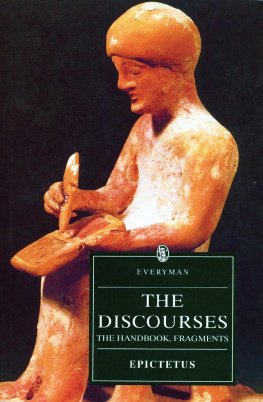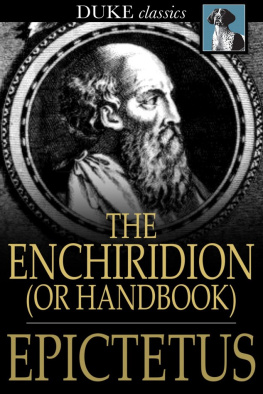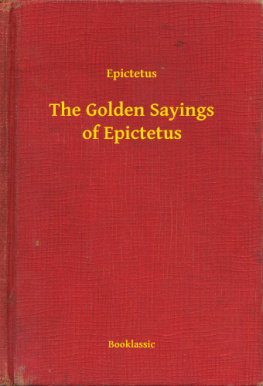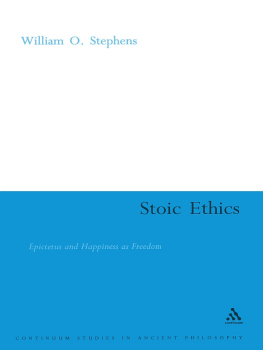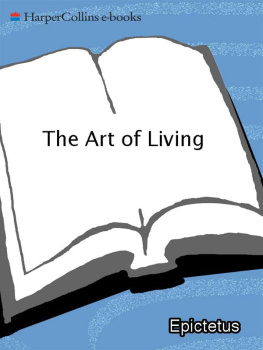Epictetus - The philosophy of Epictetus: golden sayings and fragments
Here you can read online Epictetus - The philosophy of Epictetus: golden sayings and fragments full text of the book (entire story) in english for free. Download pdf and epub, get meaning, cover and reviews about this ebook. City: Mineola;New York, year: 2017, publisher: Dover Publications, genre: Science. Description of the work, (preface) as well as reviews are available. Best literature library LitArk.com created for fans of good reading and offers a wide selection of genres:
Romance novel
Science fiction
Adventure
Detective
Science
History
Home and family
Prose
Art
Politics
Computer
Non-fiction
Religion
Business
Children
Humor
Choose a favorite category and find really read worthwhile books. Enjoy immersion in the world of imagination, feel the emotions of the characters or learn something new for yourself, make an fascinating discovery.
The philosophy of Epictetus: golden sayings and fragments: summary, description and annotation
We offer to read an annotation, description, summary or preface (depends on what the author of the book "The philosophy of Epictetus: golden sayings and fragments" wrote himself). If you haven't found the necessary information about the book — write in the comments, we will try to find it.
The philosophy of Epictetus: golden sayings and fragments — read online for free the complete book (whole text) full work
Below is the text of the book, divided by pages. System saving the place of the last page read, allows you to conveniently read the book "The philosophy of Epictetus: golden sayings and fragments" online for free, without having to search again every time where you left off. Put a bookmark, and you can go to the page where you finished reading at any time.
Font size:
Interval:
Bookmark:
THE PHILOSOPHY OF EPICTETUS
Golden Sayings and Fragments

Epictetus
DOVER PUBLICATIONS, INC.
MINEOLA, NEW YORK
DOVER THRIFT EDITIONS
GENERAL EDITOR: SUSAN L. RATTINER
EDITOR OF THIS VOLUME: JANET BAINE KOPITO
Copyright
Copyright 2017 by Dover Publications, Inc.
All rights reserved.
Bibliographical Note
This Dover edition, first published in 2017, is a republication of The Golden Sayings of Epictetus from Volume 2 of The Harvard Classics, published by P. F. Collier & Son, New York, in 1909. A new introductory Note has been specially prepared for this edition.
International Standard Book Number
ISBN-13: 978-0-486-81123-9
ISBN-10: 0-486-81123-9
Manufactured in the United States by LSC Communications
81123901 2017
www.doverpublications.com
Note
Epictetus (c. 55135 CE), born in Phrygia (present-day Turkey), was of Greek heritage. He is known to have been a slave in Rome during the time of Nero. He became familiar with the philosophy of the Stoics by attending the lectures of C. Musonius Rufus; Epictetus himself, after his emancipation from slavery, taught Stoicism in Rome. When philosophers were banished from Italy about 90 CE by the emperor, Domitian, Epictetus traveled to Nicopolis (in Epirus, western Greece), where he continued to teach the philosophy. References to Socrates, Diogenes, Zeno, Hercules, and Greek gods such as Zeus and Athena provide a vivid historical context for the Golden Sayings [a selection from the Discourses and The Encheiridion (the manual or handbook)]. Particulars of his death are unknown.
Epictetuss lectures and pronouncements are preserved in writings such as the Golden Sayings thanks to the efforts of Arrian, a Greek philosopher and historian who was a disciple of Epictetus. It is Arrians transcriptions that survive today, adding Epictetus to the long line of philosophers influenced by the Stoics. The philosophy, which originated in Greece in the early fourth century BCE, became popular in Rome during the empire but was subject to the favor of the emperor (Domitian rejected it, but Marcus Aurelius was an enthusiastic adherent). As a practical philosophy, rather than a primarily theoretical one, Stoicism was useful as a guide for living ones everyday lifeStoics believed that although we cannot control everything in our lives, we should strive to set goals that are achievable and over which we do have control. Contemporary concepts such as self-empowerment and positive thinking can be discerned in many Stoic beliefs.
The following selection of memorable quotations from Epictetus, drawn from the present compilation, offers guidelines for living a responsible and self-determined life (section numbers are given in brackets):
Wouldst thou have men speak good of thee? speak good of them. And when thou hast learned to speak good of them, try to do good unto them, and thus thou wilt reap in return their speaking good of thee. [L]
What you shun enduring yourself, attempt not to impose on others. You shun slaverybeware of enslaving others! [XLI]
When a youth was giving himself airs in the Theatre and saying, I am wise, for I have conversed with many wise men, Epictetus replied, I too have conversed with many rich men, yet I am not rich! [LXV]
To you, all you have seems small: to me, all I have seems great. Your desire is insatiable, mine is satisfied... [L]et your desire go! covet not many things, and you will obtain. [XCV]
If any be unhappy, let him remember that he is unhappy by reason of himself alone. For God hath made all men to enjoy felicity and constancy of good. [CXXII]
Asked, Who is the rich man? Epictetus replied, He who is content. [CLXXXII]
Fortify thyself with contentment: that is an impregnable stronghold. [Fragments attributed to Epictetus, XVII]
Contents
THE PHILOSOPHY OF EPICTETUS
Golden Sayings and Fragments
I
ARE THESE the only works of providence in us? What words suffice to praise or set them forth? Had we but understanding, should we ever cease hymning and blessing the Divine Power, both openly and in secret, and telling of His gracious gifts? Whether digging or ploughing or eating, should we not sing the hymn to God:
Great is God, for that He has given us such instruments to till the ground withal:
Great is God, for that He hath given us hands, and the power of swallowing and digesting; of unconsciously growing and breathing while we sleep!
Thus should we ever have sung: yea and this, the grandest and divinest hymn of all:
Great is God, for that He hath given us a mind to apprehend these things, and duly to use them!
What then! seeing that most of you are blinded, should there not be some one to fill this place, and sing the hymn to God on behalf of all men? What else can I that am old and lame do but sing to God? Were I a nightingale, I should do after the manner of a nightingale. Were I a swan, I should do after the manner of a swan. But now, since I am a reasonable being, I must sing to God: that is my work: I do it, nor will I desert this my post, as long as it is granted me to hold it; and upon you too I call to join in this selfsame-hymn.
II
HOW THEN do men act? As though one returning to his country who had sojourned for the night in a fair inn, should be so captivated thereby as to take up his abode there.
Friend, thou hast forgotten thine intention! This was not thy destination, but only lay on the way thither.
Nay, but it is a proper place.
And how many more of the sort there be; only to pass through upon thy way! Thy purpose was to return to thy country; to relieve thy kinsmens fears for thee; thyself to discharge the duties of a citizen; to marry a wife, to beget offspring, and to fill the appointed round of office. Thou didst not come to choose out what places are most pleasant; but rather to return to that wherein thou wast born and where thou wert appointed to be a citizen.
III
TRY TO enjoy the great festival of life with other men.
IV
BUT I have one whom I must please, to whom I must be subject, whom I must obey:God, and those who come next to Him. He hath entrusted me with myself: He hath made my will subject to myself alone and given me rules for the right use thereof.
V
RUFUS USED to say, If you have leisure to praise me, what I say is naught. In truth he spoke in such wise, that each of us who sat there, thought that some one had accused him to Rufus:so surely did he lay his finger on the very deeds we did: so surely display the faults of each before his very eyes.
VI
BUT WHAT saith God?Had it been possible, Epictetus, I would have made both that body of thine and thy possessions free and unimpeded, but as it is, be not deceived:it is not thine own; it is but finely tempered clay. Since then this I could not do, I have given thee a portion of Myself, in the power of desiring and declining and of pursuing and avoiding, and in a word the power of dealing with the things of sense. And if thou neglect not this, but place all that thou hast therein, thou shalt never be let or hindered; thou shalt never lament; thou shalt not blame or flatter any. What then? Seemeth this to thee a little thing?God forbid! Be content then therewith!
And so I pray the Gods.
VII
WHAT SAITH Antisthenes? Hast thou never heard?
Next pageFont size:
Interval:
Bookmark:
Similar books «The philosophy of Epictetus: golden sayings and fragments»
Look at similar books to The philosophy of Epictetus: golden sayings and fragments. We have selected literature similar in name and meaning in the hope of providing readers with more options to find new, interesting, not yet read works.
Discussion, reviews of the book The philosophy of Epictetus: golden sayings and fragments and just readers' own opinions. Leave your comments, write what you think about the work, its meaning or the main characters. Specify what exactly you liked and what you didn't like, and why you think so.

